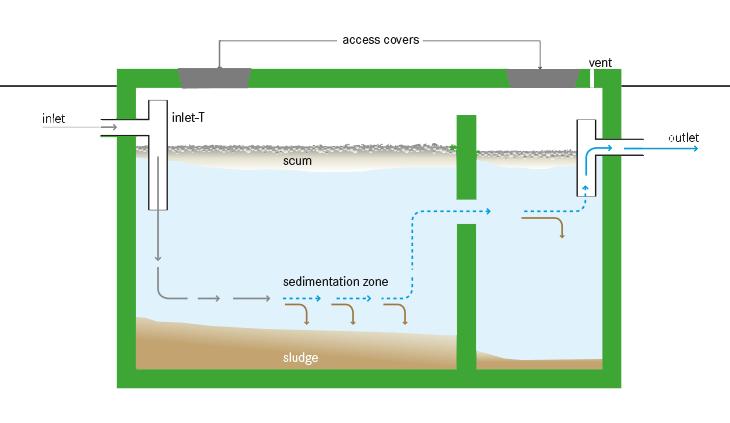Are you meeting the requirements of the new septic tank emptying regulations that come into force on the 1st January 2020?
What are septic tanks?
Septic tanks are a simple onsite sewage facility. Septic tanks are an underground chamber that uses anaerobic processes, settling and reducing solids and organics. The treated wastewater is then discharged to ground via a correctly constructed drainage field. This does not include a soakaway put, crate or tunnel or Ezy Drain as these are not allowed for septic effluent disposal.
A drainage field is an infiltration system placed in trenches with pipes, over a drainage stone in a closed loop design allowing the wastewater to trickle through the ground for further treatment by soil bacteria.
You cannot use soakaways (method for draining rainwater). If your current system includes a soakaway you will need to attain a permit from the Environment Agency to assess the risk to groundwater or change to a drainage field.

The General Binding Rules have been put in place to protect surface water resources (e.g. rivers, streams etc.) from pollution caused by septic tanks and other small-scale sewage treatment plants.
It’s imperative that you’re aware of changing legislation, if you have a septic tank that discharges directly into a watercourse such as a river, stream, canals, ditches, surface water drains or any other type of watercourse then it must be replaced or upgraded by 2020. Your septic tank must meet the new standards:
- Replacing – must use a sewage treatment plant with a full BS EN 12566-3 Certification
- Redirected – discharge to a watercourse must be stopped and diverted to a drain field that is constructed to the British Standard BS6297 2007.
- Be CE marked.
- Documentation proving your tank has a British Standard Certificate of compliance.
- Be on the British Water list of approved equipment for BS EN 12566-1.
Whichever system you choose, yearly checks are recommended to ensure ongoing optimum performance, we offer maintenance contracts as well as installation services.
Septic Tank Emptying
Your septic tank must be regularly maintained and emptied. Like any system, a septic system requires maintenance. Septic tank emptying is often the responsibility of the resident or property owner. They are often left untouched until problems of smell or blockage arise. It is extremely important that you remove sludge in your septic tank before it is full to its maximum capacity. This can be too late to avoid the soak away blocking and resulting in additional and often expensive works. Manufacturers recommend that septic tanks are emptied at regular intervals, although this will depend on the design capacity and use. A well-designed system can have capacity such that maintenance intervals can be up to 12 months, this will reduce significantly if more people live in a property that the system was designed for.
Cesspits and Septic Tanks need regular emptying to avoid contamination of the surrounding areas. Waste inside the Septic Tank will build-up and our 3000-gallon waste disposal tankers will be able to empty the tank and dispose of the sewage in the correct manner.
Septic tank management: forms of neglect and abuse.
- Flushing non-biodegradable waste items down the toilet. Remember the 3 P’s: Pee, paper and poo. Do not flush wipes, cotton buds, sanitary items – this goes for drains that aren’t connected to a septic tank and are connected to a sewer.
- Using the toilet as disposal for food. This can cause a quick overload of the system leading to failure.
- Disposing of oils, grease and fats can cause the ‘inlet’ drains to block. They are difficult to degrade and can cause bad smells.
- Using water softeners can harm bacteria that break down the wastewater.
Septic tank emptying: See how we can help you comply with the new rules.
We are experts in the drainage industry; with over 30 years’ experience under our belts, and Septic Tank emptying and management is nothing new to us. Our tankers capable of tackling the biggest of drainage problems.
Septic tanks are most commonly found in rural areas where properties are not connected to main sewer systems, and septic tank manufacturers advise that septic tank emptying and maintenance should be carried out at least once a year. We can send a tanker to empty your Septic Tank and dispose of the waste in the most environmentally suitable manner – usually at your nearest sewage treatment works.
If required or asked to do so, we will even clean your septic tank, making sure that everything is in full working order and that no potential problems will arise soon. It may also be worth finding out more information on our pre-planned maintenance service where we can schedule in the emptying of your septic tank months in advance meaning that you don’t have to worry about getting in touch every time you need us. Septic tank emptying, maintenance, and management are at the core of our services so you can trust us to get the job done professionally.